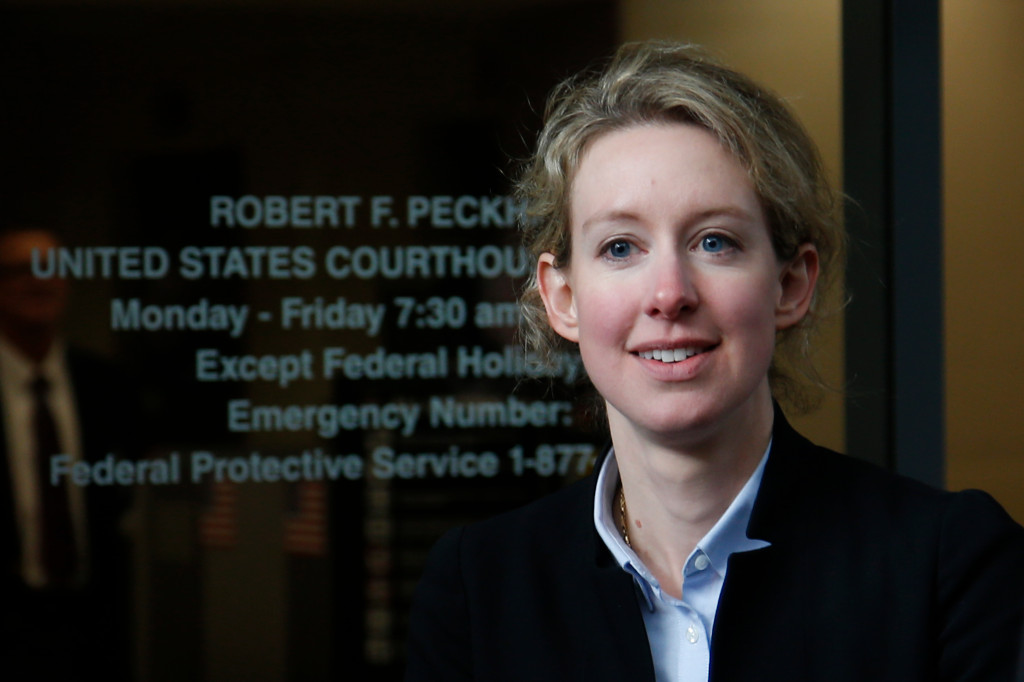Theranos founder Elizabeth Holmes’ legal team is trying to obtain documents from federal agencies that would help clear her of wrongdoing in her criminal fraud case, a member of her defense team said Monday.
Holmes, the disgraced former CEO of the defunct blood-testing startup, and former Theranos president Sunny Balwani are charged with felony conspiracy and fraud for allegedly misleading patients, doctors and investors. They claimed their machines — deployed at Walgreens stores in Palo Alto and Arizona — could conduct a full range of tests using only a few drops of blood. Both appeared in federal court in San Jose on Monday, Holmes in a light-gray suit instead of the Steve Jobs-style black turtleneck she had adopted earlier as her trademark garment.
A lawyer for Holmes told a federal court judge Monday that the defense team was expecting documents from the Food and Drug Administration and the Centers for Medicare & Medicaid Services. Those documents, lawyer Kevin Downey said, are “in many instances exculpatory.”
However, assistant U.S. attorney John Bostic told the judge that what Holmes’ team receives will depend on “whether the prosecution is deemed to have access to the documents in possession of those agencies.”
The Centers for Medicare & Medicaid Services, the nation’s main regulator of medical labs, had in 2016 threatened to hit Holmes with a two-year ban from the lab business, but then came to a deal in which she and the company agreed to a $30,000 penalty and promised to stay out of blood-testing for two years. Before Theranos shut down late last year, Holmes and Balwani told investors that Theranos didn’t need FDA approval for their product but were seeking it voluntarily because it was the “gold standard,” according to the indictment against the two. In reality, the FDA was requiring Theranos’ system be approved, the indictment said.
During Monday’s case-status hearing in U.S. District Court, Bostic said a witness in the case recently gave the prosecution a hard drive containing four terabytes of data, including promotional film and video from Theranos.
Holmes and Balwani were indicted by a grand jury in June. They are charged with 11 criminal counts of wire fraud and conspiracy to commit wire fraud.
Federal prosecutors allege that despite claims by the two, the purportedly revolutionary Theranos “miniLab” system had accuracy and reliability problems, performed limited tests, and was slower than some competing devices. The FBI has alleged that Holmes and Balwani endangered health and lives.
In Monday’s hearing, the prosecution and defense agreed that the trial will likely last at least two months. In a memo filed last week, and during the hearing, prosecutors pressed to set a trial date. But Downey said Holmes’ team was wading through a vast number of documents produced by the prosecution, and is about three months away from being able to discuss a trial date.
Judge Edward Davila declined to set a date for the trial, and scheduled another hearing on July 1.
Holmes and Theranos in March 2018 agreed to pay a $500,000 penalty to settle civil fraud charges brought by the Securities Exchange Commission, which alleged the company raised more than $700 million from investors “through an elaborate, years-long fraud in which they exaggerated or made false statements about the company’s technology, business, and financial performance.”
In the criminal case, Holmes — who dropped out of Stanford University at 19 to found Theranos in 2003 — and Balwani face maximum penalties of 20 years in prison and a $2.75 million fine, plus possible restitution, the Department of Justice has said.










